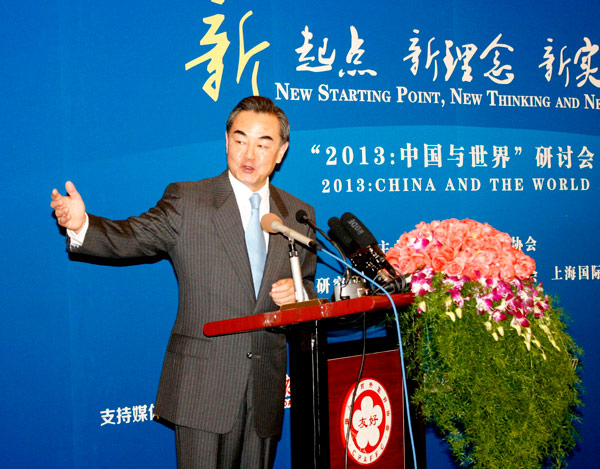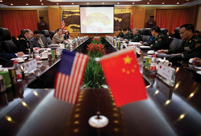 |
| Foreign Minister Wang Yi attends a seminar that reviewed China’s foreign policies in the past year in Beijing on Dec 16. (China News Service/Jin Lidong) |
China's diplomacy in 2014 will focus on neighboring countries, as its new leadership aims to forge the nation into a stronger regional power, observers from various countries said.
A stable relationship with its neighbors, particularly where the interests of Beijing and Washington overlap, will also help prevent major clashes between the two giants, they said.
"It does not mean we do not attach importance to big nations or developing countries, but neighbors will be the focus at the moment," said Jin Canrong, deputy dean of the School of International Studies under Renmin University of China.
The Peripheral Diplomacy Work Conference, held in Beijing in October, signifies this trend, Jin said. The event was the first of its kind since the People's Republic of China was established in 1949.
All seven members of the Standing Committee of the CPC Central Committee's Political Bureau attended the conference, which set the direction for work in this field for the coming five to 10 years.
President Xi Jinping said at the meeting that the neighboring region is strategically important, and that in diplomacy, one must understand the trends of the time, devise an appropriate strategy and plan carefully.
He said sound relations with neighbors will benefit both China and the region, adding that the basic tenet of diplomacy with neighboring countries is to treat them as friends and partners, make them feel safe and help them develop.
Jin said the priority in China's regional diplomacy in 2014 is to "ease tensions while adhering to China's basic stance", referring to China's territorial disputes with some nations.
He added that there are two major external problems facing Chinese diplomacy: the United States' distrust of China, and China's conflicts with some neighbors.
"It seems that so far, the US does not have the will nor the energy to directly confront China. Instead, it chose to take advantage of China's neighboring nations" to create confrontations, Jin said. "So if China can maintain stable relations with its neighbors, it can ease the two problems at the same time."
Washington has many cards to play in China, such as issues related to Japan, the Philippines and the Democratic People's Republic of Korea, Jin said, adding that Beijing has to remain alert.
Bob Berring, a law professor at the University of California, Berkeley, and a noted scholar, said that China will continue to assert itself as a great power in the Pacific.
"The age in which the United States exercised virtual control of the Pacific region is passing. Diplomacy may make this easy, but bad judgment on either side could make it hard."
However, Berring added, "The United States is easily distracted and has no coherent foreign policy toward China. This, and a looming election in the United States, will make the job more difficult."
He said "the Chinese leadership puts the good of the Chinese people before any dogmatic ideas", and he expects the coming years to see "a flexible but strong stance on international affairs".
"Regaining control of all territory that is rightfully part of China will remain the highest priority," Berring said.
Historian Odd Arne Westad, speaking to the Asia Society of New York on Dec 18, said, "There's no one that I know of currently in China, at the top level of Chinese politics, who sees China as a successful global power anytime soon.
"Today and for the next decade, possibly the next two decades, China will first and foremost be a regional power."
 |
 Commemorate 120th birth anniversary of Mao Zedong
Commemorate 120th birth anniversary of Mao Zedong Female soldiers of PLA Marine Corps in training
Female soldiers of PLA Marine Corps in training Chinese cities to have a very grey Christmas as smog persists
Chinese cities to have a very grey Christmas as smog persists China and U.S. - the national image in each other’s eyes
China and U.S. - the national image in each other’s eyes The Liaoning's combat capability tested in sea trial
The Liaoning's combat capability tested in sea trial Chinese pole dancing team show their moves in snow
Chinese pole dancing team show their moves in snow Rime scenery in Mount Huangshan
Rime scenery in Mount Huangshan Ronnie O'Sullivan: My children mean the world to me
Ronnie O'Sullivan: My children mean the world to me Shopping in Hong Kong: a different picture
Shopping in Hong Kong: a different picture Yearender: Animals' life in 2013
Yearender: Animals' life in 2013 Hello 2014 - Chinese greet the New Year
Hello 2014 - Chinese greet the New Year Chocolate 'Terracotta Warriors' appear
Chocolate 'Terracotta Warriors' appear  Top 10 domestic news of 2013
Top 10 domestic news of 2013 Red crabs begin annual migrations in Australia
Red crabs begin annual migrations in Australia Artifacts retrieved from West Zhou Dynasty
Artifacts retrieved from West Zhou DynastyDay|Week|Month